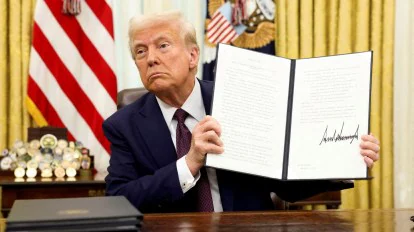Global Markets on High Alert: Trump Orders Reciprocal Tariffs, Targets VAT to Rebalance Trade
New U.S. Tariffs to Match Foreign Rates, VAT Inclusion Could Hit European Exporters Hard

Washington, D.C. – President Donald Trump has officially signed an executive action imposing reciprocal tariffs on countries that have higher import duties than the United States. The directive, signed Thursday, aims to establish trade fairness by ensuring that whatever tariffs foreign nations impose on U.S. goods, the U.S. will reciprocate with equal levies.
Beyond tariffs, Trump’s order also targets Value-Added Taxes (VAT), which he argues give foreign countries an unfair advantage over American exporters. This move could significantly impact European economies, where VAT rates dramatically increase the cost of U.S. goods compared to domestic products.
In a statement on Truth Social, Trump emphasized the need for fairness in global trade: "For many years, the U.S. has been treated unfairly by other countries, both friend and foe. This system will immediately bring fairness and prosperity back into the previously complex and unfair system of trade. A LEVEL PLAYING FIELD FOR AMERICAN WORKERS!"
Commerce Secretary Howard Lutnick and the U.S. Trade Representative have been instructed to draft the tariff framework, with April 1 as the target date for implementation. Trump noted that countries maintaining lower tariffs on U.S. goods will face no changes, but those with higher levies should expect new duties on their exports.
Additionally, Trump’s order considers non-monetary trade barriers, such as government subsidies, regulatory restrictions, and VAT-based advantages, as reasons for tariff adjustments.
Analysts predict that if VAT is included in the calculations, the effective tariff rate on European exports could rise by over 10%, making it a major concern for EU economies.
Global Ramifications
The new policy could have severe implications for exporters worldwide, particularly in Europe, Japan, South Korea, and India, which Trump has accused of unfair trade practices. The U.S. president also hinted at additional import taxes on automobiles, semiconductors, and pharmaceuticals, further escalating tensions.
With global markets already unsettled, Bloomberg Economics suggests that developing nations with historically high tariffs on U.S. goods could be hit hardest. While Trump has left the door open for negotiation, the move injects uncertainty into international trade relations.
Next Steps
As Trump prepares for discussions with foreign leaders, including Indian Prime Minister Narendra Modi, businesses and global markets await further clarification on how these new tariffs will unfold and whether they could escalate into a broader trade conflict.